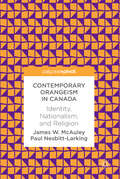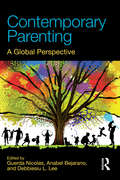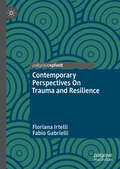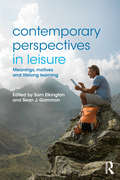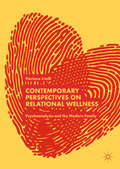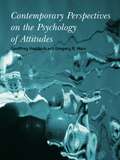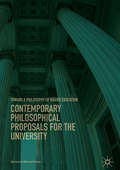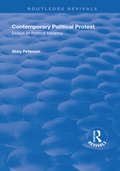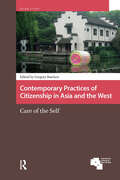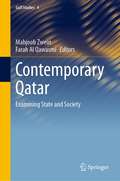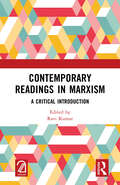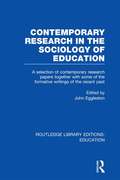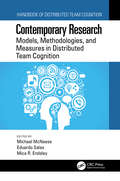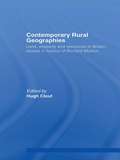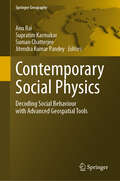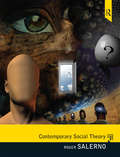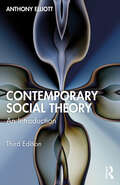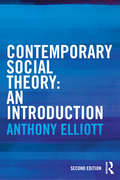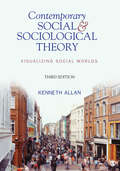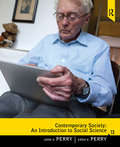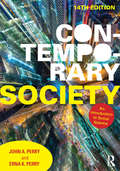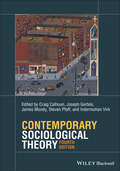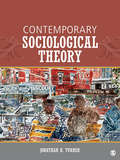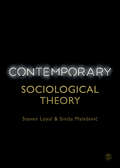- Table View
- List View
Contemporary Orangeism in Canada: Identity, Nationalism, and Religion
by James W. Mcauley Paul Nesbitt-LarkingThis book uses original research and interviews to consider the views of contemporary members of the Orange Order in Canada, including their sense of political and societal purpose, awareness of the decline of influence, views on their present circumstances, and hopes for the future of Orangeism in Canada. In so doing, it details the organisational structure of Canadian society: the role of religion in public life, the changing context of multicultural Canada, and the politics of resistance of a political and social organisation in decline. This book offers a social scientific complement to existing historical work on the role of the Orange Order in Canadian society, and builds upon it through an analysis of contemporary Orangeism. It considers the Orange Order as a worldwide body and makes some comparisons and contrasts with its organisational status and membership in Ireland and elsewhere. As such, the book makes a distinctive contribution to our knowledge of a fraternal organisation and the role of religious belief and politics in contemporary society.
Contemporary Parenting: A Global Perspective
by Guerda Nicolas Anabel Bejarano Debbiesiu L. LeeThrough a global, multidisciplinary perspective, this book describes how four factors influence parenting practices: a countries historical and political background, the parent’s educational history, the economy and the parent’s financial standing, and advances in technology. Case studies that illustrate the impact these four factors have on parents in various regions help us better understand parenting in today’s global, interconnected world. Descriptions of parenting practices in countries from Europe, North and South America, Africa, Asia, and the Caribbean give readers a contemporary perspective. Both research and clinical implications when working with families from various cultures are integrated throughout. Part I reviews the four major factors that shape parenting practices. Part II features cases written by contributors with extensive experience in parenting practice and research that bring to life the ways in which these four factors influence parenting within their region. Each chapter in Part II follows the same format to provide consistency for comparative purposes: an introduction, historical and political, economic, educational, and societal factors and parenting practices, and a conclusion. Each case reviews: Historical and political factors such as slavery, war, and natural disasters and how these factors impact cultural beliefs, parenting behaviors, and a child’s development Economic factors which impact the capacity for consistent, involved parenting which can result in low IQ, behavioral problems, depression, and domestic conflict and the need to account for financial factors when developing intervention programs Educational levels impact on parenting practices and their children’s achievements Advances in technology and its impact on parenting practices. Intended for graduate or advanced undergraduate courses in families in global context, immigrant families, family or public policy, multiculturalism or cross-cultural psychology, social or cultural development, counseling, social work, or international development taught in human development and family studies, psychology, social work, sociology, anthropology, racial studies, and international relations, this book also appeals to practitioners and researchers interested in family studies and child development and policy and program managers of governments, NGOs, and mental health agencies.
Contemporary Perspectives On Trauma and Resilience
by Floriana Irtelli Fabio GabrielliThis book offers a contemporary perspective on trauma and resilience, presenting an overview of surrounding issues, and describing their history and in the context of recent scientific research. This book argues that the skills underlying resilience can be strengthened at any age, and that it is never too late to build resilience or embark on a path of healing and evolution. Resilience is intertwined with the ability to learn, develop relationships with others, motivate oneself in achieving goals, set aspirations and have determination in pursuing those goals. All of these aspects can be fostered through a psychotherapy, reprocessing the traumatic memory within a safe and empathic space. The book is innovative because it provides an overview of theories that pertain to different fields of psychology: areas pertaining to psychoanalysis, cognitive psychology, EMDR and many others are explored in depth while also highlighting the advances that science has made regarding these issues. This book will be a valuable contribution to the knowledge of students, mental health professionals, and it can also be a very interesting manuscript for those who want to broaden their knowledge about trauma and resilience.
Contemporary Perspectives in Leisure: Meanings, Motives and Lifelong Learning
by Sam Elkington Sean J. GammonWe are entering a new era of leisure. Quality rather than quantity is now the focus of researchers, policymakers and managers. Technological change, an ageing population and a harsh economic climate are changing the values and practices of leisure, as well as the relationship between leisure, society and the individual. Contemporary Perspectives in Leisure uses a variety of disciplinary approaches to introduce the most important trends in contemporary leisure in the Twenty-First Century. With contributions from some of the leading international figures in modern leisure studies, the book examines key philosophical and theoretical debates around leisure, with reference to concepts such as happiness, enjoyment and quality of life, as well as the most interesting contemporary themes in leisure studies, from youth leisure and ‘dark’ leisure to technology and adventure. Understanding changes in leisure helps us to better understand changes in wider society. Contemporary Perspectives in Leisure is a perfect companion to any course in leisure studies, and useful reading for any student or scholar working in sociology, cultural studies, recreation, tourism, sport, or social psychology.
Contemporary Perspectives on Relational Wellness: Psychoanalysis and the Modern Family
by Floriana IrtelliThis book proposes new perspectives on relational wellness and the contemporary family—combining a psychoanalytic overview with scientific research about the burgeoning popularity of divorce, the increase in “stepfamilies,” and the use of social networks as well as other technologies. In this day and age, psychoanalysis has become increasingly interested in hyper-modern scenarios; for example, social networks and apps provide matching algorithms, which allow users to connect with people of similar interests. These networks have become one of the places where dissatisfied partners seek "more satisfactory situations.” In the United Kingdom, cohabitation lasts for up to two years, on average, and 40% of marriages end in divorce. In the United States, the percentage rises: it has now reached 50%. Today the value of temporariness, in which everything is fragmented, is exalted. On the other hand, is it wrong to deny the natural ebb and flow of human feeling?
Contemporary Perspectives on the Psychology of Attitudes
by Gregory R. Maio Geoffrey HaddockWhat is an attitude? How do different research approaches characterise 'attitude' and its applications in social psychology?The Attitude concept has long formed an indispensable construct in social psychology. In this volume, internationally renowned contributors review contemporary developments in research and theory to capture the current metamorphosis of this central concept. This book draws together the latest developments in the field to provide a scholarly and accessible overview of the study of attitudes, examining the implications for its position as a paradigm of social psychological understanding. Dividing the subject into two main parts, this book first addresses the structural and behavioural properties of attitudes, including the affective-cognitive structure of attitudes, the nature of attitude ambivalence and intention-behaviour relations. The second section focuses on representational and transformational processes, such as meta-cognitive attitudinal processes, the role of implicit and explicit attitudinal processes, cultural influences and attitude change. In a third, concluding section, the editors draw together these contemporary perspectives and elaborate on their impact for future theorising and research into attitudes. Empirically supported throughout, this collection represents a timely integration of the burgeoning range of approaches to attitude research. It will be of interest to social psychologists, sociologists, political scientists and researchers with an interest in attitudinal phenomena.
Contemporary Philosophical Proposals for the University
by Aaron Stoller Eli KramerThis edited collection brings together a robust range of philosophers who offer theoretically and critically informed proposals regarding the aims, policies, and structures of the university. The collection fills a major gap in the landscape of higher education theory and practice while concurrently reviving a long and often forgotten discourse within the discipline of philosophy. It includes philosophers from across the globe representing disparate philosophical schools, as well as various career stages, statuses, and standpoints within the university. There is also a diversity in method, approach and style, which varies from personal narratives and case studies, to philosophical genealogies, to traditional philosophical essays, and to systematic theories. The collection can serve as a theoretical resource for critically minded administrators and faculty who wish to analyze and change policies and structures at their home institutions. It will introduce them to a wide range of possible educational imaginaries, as well as provide them with productive suggestions for pragmatic change on campuses.
Contemporary Political Protest: Essays on Political Militancy
by Abby PetersonThis title was first published in 2001. An investigation of the new wave of militant political activity emerging across Europe. The book examines the role of emotions in militant activity, the way in which the body is implicated in militant political actions, and the concept of media modernity as a precondition for the contemporary politics of militancy.
Contemporary Practices of Citizenship in Asia and the West: Care of the Self (Asian Cities)
by Gregory BrackenContemporary Practices of Citizenship in Asia and the West: Care of the Self examines urban communities and societies in Asia and the West to shed much-needed light on issues that have emerged as the world experiences its new urban turn. An urbanized world should be an improving place, one that is better to live in, one where humans can flourish. This collection of essays examines contemporary practices of care of the self in cities in Asia and the West, including challenges to citizenship and even the right to the city itself. Written by a range of academics from different backgrounds (from architecture and urbanism, anthropology, social science, psychology, gender studies, history, and philosophy), their trans- and multidisciplinary approaches shed valuable light on what are sometimes quite old problems, leading to fresh perspectives and new ways of dealing with them. One thing that unites all of these papers is their people-centred approach, because, after all, a city is its people.
Contemporary Qatar: Examining State and Society (Gulf Studies #4)
by Mahjoob Zweiri Farah Al QawasmiThis book addresses critical topics and unanswered questions on the contemporary state of Qatar. Drawing together a unique combination of authors that have researched the Gulf Cooperation Council (GCC) in general, and the state of Qatar specifically, each author provides an in-depth empirical analysis of Qatar’s current social, political, and economic landscape against a historically informed backdrop. Cognizant of its rapid state of flux, the contributors collectively provide a comprehensive overview of the intersection of these respective areas, delving into the historical creation of Qatar as a state, its politics and systems of governance, its economic strata and reliance on natural resources, its society and national identity, its new and thriving sports culture, and, most topically, matters of diplomacy, the 2017 blockade, and its armed forces. Owing to the contributors’ invaluable firsthand experience and knowledge of Qatar, this book provides valuable insights into this nation, at once old and new, and its intertwined trajectories in its socio-political and economic positionality within the region. This book is an invaluable resource for students and scholars researching the Middle East generally, and the Gulf, specifically, with interests in topics such as politics and international relations, political economy and foreign policy, development, sources of social change, societal activism, popular culture, and the various elements of identity.
Contemporary Readings in Marxism: A Critical Introduction
by Ravi KumarThis volume straddles between being a compilation of chapters exploring the fundamental conceptual categories within Marxism while engaging with those categories at the same time demonstrating the dynamic ability of the Marxian theoretical paradigm to evolve. Challenging the misinterpretation of Marxian theory as rigid, deterministic and outdated it shows how the concepts used by the framework become relevant tools for understanding and analysing society. Divided across two parts the volume grounds the Marxian concepts in a concrete historico-material context of India. It will be an important source for any student interested in social theory in general and Marxism in particular.
Contemporary Research in the Sociology of Education (Routledge Library Editions: Education)
by John EgglestonThe subject matter of this book – what happens in schools, the effects of curriculum change, the reasons why some children are successful and others are not – explains just why the sociology of education is one of the most important areas to achieve political importance. There are five sections to the book covering: Educational Achievement; Educational Provision; The Organization of the School; Roles in the School and Values and Learning. The editor discusses the implications of the material presented (much of which was available for the first time when this book was originally published).
Contemporary Research: Models, Methodologies, and Measures in Distributed Team Cognition
by Michael D. McNeese; Eduardo Salas; Mica R. EndsleyThe objective of Contemporary Research: Models, Methodologies, and Measures in Distributed Team Cognition is to advance knowledge in terms of real-world interactions among information, people, and technologies through explorations and discovery embedded within the research topics covered. Each chapter provides insight, comprehension, and differing yet cogent perspectives to topics relevant within distributed team cognition. Experts present their use of models and frameworks, different approaches to studying distributed team cognition, and new types of measures and indications of successful outcomes. The research topics presented span the continuum of interdisciplinary philosophies, ideas, and concepts that underline research investigation. Features Articulates distributed team cognition principles/constructs within studies, models, methods, and measures Utilizes experimental studies and models as cases to explore new analytical techniques and tools Provides team situation awareness measurement, mental model assessment, conceptual recurrence analysis, quantitative model evaluation, and unobtrusive measures Transforms analytical output from tools/models as a basis for design in collaborative technologies Generates an interdisciplinary approach using multiple methods of inquiry
Contemporary Rural Geographies: Land, property and resources in Britain: Essays in honour of Richard Munton
by Hugh CloutThis book provides a cohesive set of research statements on critical related issues in British rural geography, as well as echoing the priorities identified by an influential figure in British rural geography, Richard Munton. This book demonstrates that the rural world needs to be seen in a far wider perspective than that of agriculture/ food production, in order to comprehend how resources are being appraised and exploited in new ways, and to respond to the pressing challenges of sustainability for the decades ahead. Chapters adopt a time perspective to explore a series of key themes: the rise of productivist farming ways of conceptualising agricultural change the evolution of landownership and property rights rural and urban agendas for nature conservation the gap between policy and action for sustainable development. The final set of chapters is devoted to policy-related issues associated with agricultural change and the profound challenge of rural diversification for the future. The last chapter traces the prominent career of Richard Munton.
Contemporary Social Physics: Decoding Social Behaviour with Advanced Geospatial Tools (Springer Geography)
by Jitendra Kumar Pandey Anu Rai Supratim Karmakar Suman ChatterjeeThis volume delves into how cutting-edge geospatial tools are revolutionizing social physics—the quantitative study of human behavior and spatial dynamics. Through real-world case studies, the book demonstrates how geospatial analysis is applied to pressing social and environmental challenges, from migration flows and resource distribution to healthcare access, crime, disaster management, and urban planning. Readers will explore how these tools reveal the complexities of human movement, socio-spatial interactions, and behavioral patterns. The book is structured into five sections, each tackling key topics at the intersection of social physics and geospatial analysis: Population Dynamics and Social Behavior: Examines refugee settlements, migrations, resource allocation, and the socio-spatial impacts of political violence and the COVID-19 pandemic. Social Learning and Environmental Management: Highlights how social learning influences agriculture, healthcare, and environmental management, with geospatial techniques improving outcomes like riverbank stability and crop yields. Spatial Heterogeneity and Social Behavior: Investigates how social behavior shifts across different spatial contexts, with a focus on crime, inequality, and pandemic response, including detailed insights into Kolkata’s COVID-19 management. Social Physics and Sustainability: Demonstrates how geospatial tools can advance sustainability efforts, including waste management, transportation optimization, and urban planning for peri-urban areas. Ideal for academics, researchers, urban planners, and policymakers, this volume provides innovative methodologies to address complex social, environmental, and economic challenges. Whether examining migration trends or advancing sustainability, this book equips readers with the tools to transform how we understand human behavior and space.
Contemporary Social Theory
by Roger SalernoContemporary Social Theory helps students explore, describe, and discuss how social theory relates to their own experiences, popular culture, and the world in which they live. It advances the view that new theory can be effectively used to assess social and cultural phenomena. The text identifies the important intellectual movements, categories, and paradigms that have occurred in the study of social theory. It also looks at issues closely related to contemporary social theory, such as: the postmodern condition, globalization, postcolonialism, inequality, gender, race, and human sexuality.
Contemporary Social Theory: An Introduction
by Anthony ElliottNow in its third edition, Anthony Elliott’s comprehensive, stylish and accessible introduction continues to be the indispensable guide to social theory. Fully revised and updated, the book examines the major theoretical traditions from the Frankfurt School to posthumanism, and from feminism and post-structuralism to globalization theory and beyond. Classical debates in social theory are given careful appraisal, as are the major contemporary theorists – including Jurgen Habermas, Judith Butler, Anthony Giddens, Pierre Bourdieu, Julia Kristeva, Slavoj Žižek, Manuel Castells, Ulrich Beck, Zygmunt Bauman, Shoshana Zuboff and Bernard Stiegler. This edition includes a new chapter on the digital revolution, with consideration of how digital technologies in general and artificial intelligence in particular are reshaping societies. Like its predecessors, the third edition of Contemporary Social Theory combines stylish exposition with reflective social critique and original insights. This volume will prove a superb textbook with which to navigate the twists and turns of contemporary social theory as taught in the disciplines of sociology, politics, cultural and media studies and many more.
Contemporary Social Theory: An introduction
by Anthony ElliottIn this comprehensive, stylish and accessible introduction to contemporary social theory, Anthony Elliott examines the major social theoretical traditions. The first edition set new standards for introductory textbooks, such was the far-reaching sweep of social theorists discussed – including Theodor Adorno, Herbert Marcuse, Michel Foucault, Jacques Lacan, Jacques Derrida, Anthony Giddens, Pierre Bourdieu, Julia Kristeva, Jurgen Habermas, Judith Butler, Slavoj Zizek, Manuel Castells, Ulrich Beck, Zygmunt Bauman, Giorgio Agamben and Manuel De Landa. From the Frankfurt School to globalization, from feminism to the network society, this new edition has been fully revised and updated, taking into account the most recent developments in social theory. The second edition also contains a completely new chapter on classical social theory, allowing students to contextualise the modern debates. Like its predecessor, the second edition of Contemporary Social Theory combines stylish exposition with reflective social critique and original insights. This new edition will prove a superb textbook with which to navigate the twists and turns of contemporary social theory as taught in the disciplines of sociology, politics, history, cultural studies and many more.
Contemporary Social and Sociological Theory: Visualizing Social Worlds
by Kenneth AllanIn the Third Edition of Ken Allan′s highly-praised Contemporary Social and Sociological Theory book, sociological theories and theorists are explored using a straightforward approach and conversational, jargon-free language. Filled with examples drawn from everyday life, this edition highlights diversity in contemporary society, exploring theories of race, gender, and sexuality that address some of today′s most important social concerns. Through this textbook students will learn to think theoretically and apply theory to their own lives.
Contemporary Society: An Introduction to Social Science
by John A Perry Erna K PerryThis best-selling text emphasizes that social and cultural changes are the pervasive realities of our era. One of the main themes of Contemporary Society is that the transition from an industrial to a post-industrial order in the modern world is fraught with difficulties, as was the transition from an agricultural to an industrial order in an earlier era. Within this framework, we can observe the increasing fragmentation of the social order, which tends to lead people away from community and a common purpose and often invites conflict and disunity. At the same time, countervailing social forces are also at work, providing some stability, some shelter in the storm. Finally, societies are faced with the rapid and transformative power of information technology, a fact that propels separate groups of people into a global entity.
Contemporary Society: An Introduction to Social Science
by John A Perry Erna K PerryThis best-selling text emphasizes why social and cultural changes are the pervasive realities of our time. A key theme of Contemporary Society is that the transition from an industrial to a post-industrial order in today’s world is fraught with difficulties, as was the transition from an agricultural to an industrial order in an earlier era. Within this framework, we can observe the increasing fragmentation of the social order today, which tends to lead people away from community and a common purpose, more often bringing conflict and disunity. Still, countervailing social forces are also at work, providing some stability--some shelter in a sea of change.? Ever more, societies are faced with the rapid and transformative power of information technology, which helps propel separate groups of people into a global entity.This introduction to the social sciences shows what the authors have learned from such disciplines as anthropology, geography, history, sociology, psychology, political science, and economics--and how to apply social science approaches to an ever-faster tempo of change. ?The authors cover family life, interaction with others, racial and ethnic diversity, education, religion, population, environment, and many other topics analyzed in a student-friendly approach. ? New to this Edition The integration and flow of the text has been improved for better student comprehension.? ? Expanded selection of Web Links to many more sites for student research, many relevant to their interests and entertainment choices Enriched focus on applying social science knowledge to current events (transcending a complete reliance on assumptions from the media) New/expanded coverage on topics throughout the book, including ? ?????? New findings from global warming research and its implications for social life and policy ?????? New developments in race relations in an integrated approach throughout many chapters ?????? Deepening inequality and the implications that threaten family, education, and student futures—nationally and globally ?????? Gender, including new developments in legal gay marriage and transgender ?????? Expanded coverage of genetics and the medical potential of human genome sequencing ???????New developments in astrophysics and their potential implications for society ??Updated Statistics throughout
Contemporary Sociological Theory
by Craig Calhoun Steven Pfaff Joseph Gerteis James Moody Indermohan VirkThe new edition of the definitive undergraduate guide to contemporary sociological theory, with updated reading selections throughout The fourth edition of Contemporary Sociological Theory offers a thorough introduction to current perspectives and approaches in sociology and social science. Covering a broad range of essential topics, this comprehensive volume provides students with the foundation necessary for understanding the theoretical underpinnings of present-day debates in the diverse field. In-depth yet accessible readings address micro-sociological analysis, symbolic interactionism, network theory, phenomenology, critical theory, structuralism, feminist theory, and more. This classic text is fully revised to incorporate the most representative and up-to-date material, including new readings addressing debates on gender, power, and inequality. New editorial introductions clarify and contextualize the selected readings, while up-to-date examples highlight connections to today’s theoretical discussions. This authoritative survey of contemporary sociological theory: Presents substantial primary source texts with detailed introductions, rather than brief excerpts and basic overviews Examines the sociological theories of Foucault, Giddens, Bourdieu, and Habermas Discusses debates over modernity and postmodernity, crisis and change, and race and difference Provides historical and intellectual perspective to each selected reading in the book Includes extensive references to further readings and resources Contemporary Sociological Theory, Fourth Edition provides the depth of coverage students require for undergraduate courses in social and sociological theory as well as courses in wider social science programs such as human geography, anthropology, criminology, and urban studies. In combination with its complement Classical Sociological Theory, Fourth Edition, Contemporary Sociological Theory remains the most complete overview of sociological theory available.
Contemporary Sociological Theory
by Jonathan H. TurnerWritten by award-winning scholar, Jonathan Turner, Contemporary Sociological Theory covers the range of diversity of theory in nine theoretical traditions, and variants of theoretical approaches in these traditions. The result is a comprehensive review of present-day theorizing in sociology covering functional, evolutionary, ecological, conflict, interactionist, exchange, structuralist, cultural, and critical theories and the major proponents of these theories. Moreover, for each theoretical tradition, it origins are examined in a separate chapter with an eye to how classical theorists influenced the work of key contemporary scholars. This book will serve as a valuable resource for those readers seeking in-depth and comprehensive coverage of contemporary traditions in their historical contexts. Unlike many texts, coverage is comprehensive and deep. The theories and their origins are examined in detail so that readers can fully understand the origins and present profile of theories in present-day sociology. Unlike many texts that skim over theories on the surface, this book seeks to unlock for the reader their underlying structure of each theory. The book is written in a modular format so that theories and traditions can be examined in any order, and in many diverse combinations. If desired, only the contemporary theories can be read without attention to their historical contexts, or the reverse is true if readers want to understand the historical origins of a particular theoretical tradition. Since Jonathan Turner is an active theorist in his own right, he brings to the book an appreciation of how theories are created as an insider rather than as only a commentator on theory. As such, he is able to bring out the underlying assumptions, structure, and form of a theory in new and interesting ways for casual readers and scholars alike.
Contemporary Sociological Theory
by Steven Loyal Siniša MaleševicIntroducing you to the most important thinkers and schools of thought in contemporary sociological theory – from Parsons and Merton to the Frankfurt School to Foucault, Bourdieu, Giddens and Hochschild – this accessible textbook firmly locates key ideas in social, political and historical context. By doing so, it helps you to understand the development of central sociological concepts and how they can help us understand the contemporary world. The book includes: Lively biographical sections so you can get to know each thinker Clear and easy-to-understand accounts of each theorist’s arguments - and the most common criticisms Key concept boxes highlighting the most influential ideas This comprehensive textbook brings the diverse field of contemporary sociological theory to life. Essential reading for all students of Sociology and Sociological Theory.
Contemporary Sociological Theory
by Steven Loyal Siniša MaleševicIntroducing you to the most important thinkers and schools of thought in contemporary sociological theory – from Parsons and Merton to the Frankfurt School to Foucault, Bourdieu, Giddens and Hochschild – this accessible textbook firmly locates key ideas in social, political and historical context. By doing so, it helps you to understand the development of central sociological concepts and how they can help us understand the contemporary world. The book includes: Lively biographical sections so you can get to know each thinker Clear and easy-to-understand accounts of each theorist’s arguments - and the most common criticisms Key concept boxes highlighting the most influential ideas This comprehensive textbook brings the diverse field of contemporary sociological theory to life. Essential reading for all students of Sociology and Sociological Theory.
